|
|
|
|
February
March Continues More Ramblings
March 2, 2000:
Hello and welcome to March. I'd like to start off by apologizing
for my previous statement about food here in Pakistan. I had
a cup of the world's best ice cream (orange pistachio) the other
day and have decided it was good enough to make up for every
other dish, bad or otherwise, that I've had here. Lahore is,
after all, Pakistan's culinary center.
The past few days have been busy. I returned from a short
trip to Multan last Monday and have been running around since.
During this time I've met with several different directors and
leaders in this community who are working for improvement, i
should say, development. Many Pakistanis believe that the only
real way to help Pakistan is through Pakistan. I have visited
model schools in the rural parts of Lahore and a center for mentally
and physically disabled children in the inner city to see what
these "activists" have been working on. "There
are no bad people, just poor and helpless people," says
Rukhsana Qayyum, a woman who supports charity programs throughout
Pakistan.
I have met with handfuls of people all working towards one
thing -- the betterment of people's lives. In a country under
much scrutiny at the moment we have to remember that life here
does go on, and people are looking ahead to the future.
March 5, 2000:
Okay, what's the first thing that jumps to mind when you hear
the word "Pakistan"? Is is gun toting Muslims and opium?
Little mud hut villages and sheep? Pakistan is these things but
also, logically, much more. Envision a well run government school
for mentally and physically disabled kids and a newly built hospital
for cancer treatment and you'll be a big step closer to the overall
picture of Pakistan.
Yesterday I visited a school for special education. It was
Saturday and they were having a their kite festival. Kids and
parents were running around, the newspapers were taking photos
and teachers-in-training were bombarding me with questions about
the United States. "How are disabled children treated in
America?" and "They all live at institutions in America,
right? They aren't allowed to go home?" I looked around,
I had toured the school a few days before, meeting the kids and
watching their classes. This particular school centers around
personal, hands-on care. There are only a handful of kids in
each class so the teachers can work more directly, and also,
keep an eye on them. I'd seen lots of schools like this in the
States, and Govt. SHADAB Training Institute of Special Education
ranked right up there with the best of them.
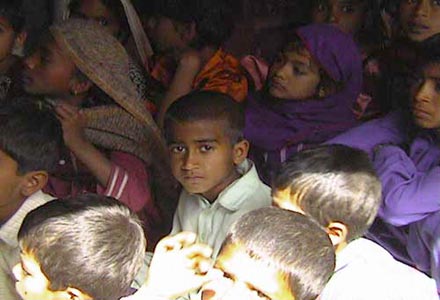
I told the teachers that the disabled kids in America can
go home and do go home, many even attending regular schools with
the rest of the kids. None of them believed me. They were taught
that special education meant institutionalization. "If I
asked just about anyone in America if they thought places like
this, " waving my arm at the school, "existed in Pakistan
they wouldn't believe me either." The teachers shook their
heads. A kite from one of the students came careening out of
the sky and hit me in the head; everyone laughed.
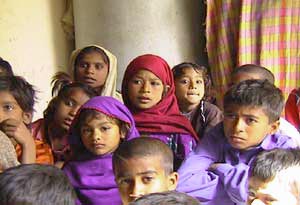
March, 8, 2000:
Oh, you had to assume it would happen sooner or later. If
you're traveling through developing countries for a year you're
bound to get sick, right? Nope, at least that's what I thought
for the first 2 and a half clear months. I even drank out of
the tap at the New Delhi train station and survived, nothing
more than a metallic taste left in my mouth. Of course, if sometime
soon all my hair decides to drop out I'll know what to blame
it on. And here I am now, slightly out of my mind from a high
fever and stomach cramps. At least I'll have another story
to tell, I thought as I was throwing up all through the night.
I can't complain too much though. If I was going to get sick
there's no better place than in Lahore, Pakistan. Okay, I'll
rephrase that. There's no better place to get sick than Mrs Rukhsana
Qayyum's house in Lahore, Pakistan. I have my own room with a
conveniently attached bathroom and a large family who intermittently
pops in to see how I'm doing. "You miss your family."
says Rukhsana, not believing in my flu-like symptoms. "You
have a long time to go, you can't miss them already." Her
voice is pained and I know she's worried because she asks me
about solo travel as a woman often enough. She swings in, clothed
in a beautiful silk shalwar kameez, the Pakistani dress,
and gives me a hug. "You can stay here as long as you like.
We are your family." And I have to admit that the Pakistanis
are a very welcoming people. There's a common saying about Americans
that, like a fish, guests get old and start smelling after three
days. Not here in Pakistan. Or, not as far as I can tell. I've
been in Lahore for close to two weeks now, over a week in the
Qayyum's home, and have never felt unwanted.
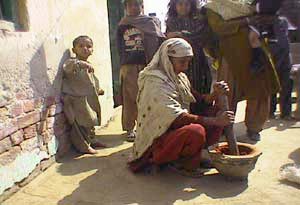
Rukhsana told me I could stay till my flight to Teheran on
the18th. That is a very tempting offer. And now that President
Clinton isn't visiting till the 25th (I was hoping to maybe high-five
him in the airport before I catch my plane) I may just take her
up on that offer.

March 14, 2000:
A friend of mine asked me how they treat the sick here in
Pakistan, "if it's any different than at home or what you're
used to?" And sitting on my bed in a room equipped with
a stereo and a treadmill, a glass of juice after taking a hot
shower, I could almost be at home. I spent days in this bed,
drinking lots of boiled water and downing extra strength Tylenol.
I slept almost 20 hours a day for three days, moving around only
to talk with people who'd come to grill me on Western vs Eastern
ideas and conceptions. (You can imagine how good those conversations
were.) Nothing too very different in the routine of a sick person,
I'd say.
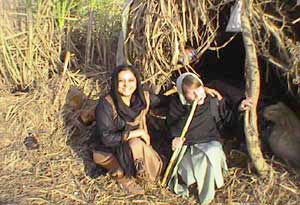
Then I remember the kitchuri, oh the kitchuri.
I sat in bed that first day thinking about saltine crackers,
jello and the way my mother would--with the most love in the
world--plunk down a large plastic bucket next to my bedside,
when lunch was rolled in. The thought of food at all made the
underside of my chin wobble and my stomach tighten, but not eating
for a day and throwing up all night had worried my host to the
point of calling the hospital so I thought I should give it a
try. I pulled off the cover and what lay inside looked like oatmeal
that had been cooked in beef bullion for a week. I wasn't far
off. It was kitchuri, a pulverized boiled-all-day rice
and lentil dish with various assortments of salt.

I ate kitchuri, or should I say I mouthed kitchuri
for four days. On the fifth day I hit my stomach. "You think
you can handle something else?" I asked it. Do you think
you can't, I thought. And walked into the dining room to
lunch with the family. We had curries and vegetables and yoghurt,
and fruit; and while we were finishing up, munching away on guavas,
I asked them about the kitchuri. A long groan came from
the two kids on the other side of the table. "You're lucky.
At least you could tell what I was. Usually it's mashed up so
much it resembles bird food. Regurgitated." I though about
regurgitated bird food and picked out another guava, my third
one. "Oh, you're stomach must really be feeling better,"
said Ahad, the third of four kids. "A little," I answered,
having eaten a total a five grains of white rice, some potatoes,
and two and a half guavas. Then, as if the image of thrown up
bugs wasn't enough for the day, Ahad continued, "Because
those will really wreck you. Your stomach can't digest the seeds."

So, with a small guava-induced relapse my stomach is slowly
returning to normal. Slowly. I leave for Islamabad tomorrow,
to the Too-Quiet City Next to the Mountains as the kids call
it, to pick up my Iran visa. I have arranged home stays for my
month in Iran but Insha'allah, I won't get a first hand
look into sick treatments there.
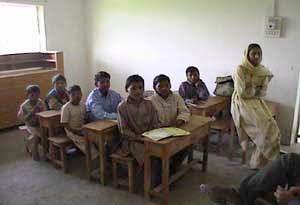
Lahore is everything you'd
expect from a developing country and much of what you wouldn't.
Everything from one-room schools (at left and at top) to schools
for special education (above), hard manual labor of sugar cane
(me munching on cane, second, left-side) to grinding red chilies
(first, left-side), and lavish weddings to servants make up the
city of Lahore.
|
|






